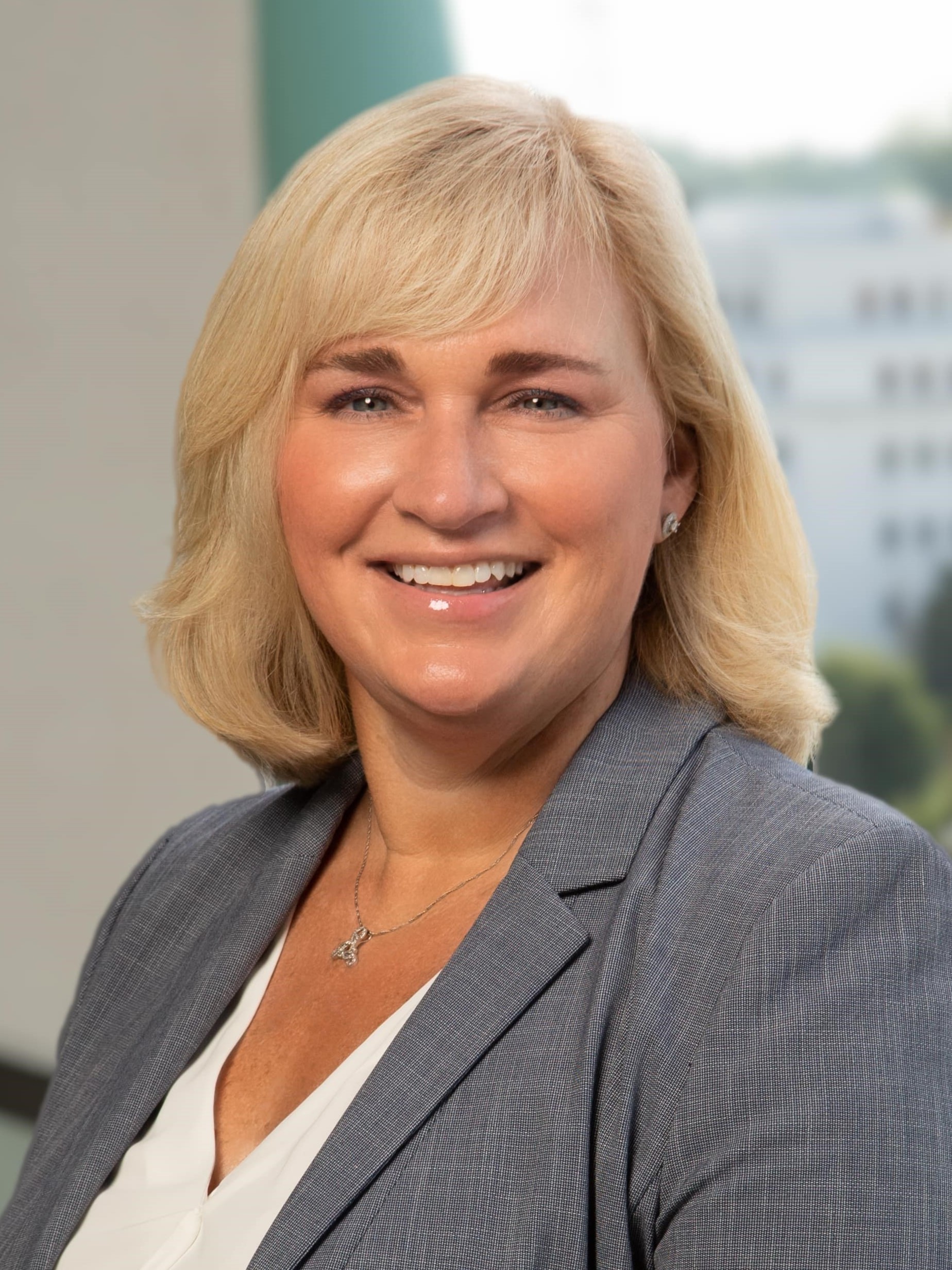Ever prepared, Alabama attorney aims to keep clients free of trouble
By Brian Cox
“My clients know to call me and let me help,” says Alabama-based attorney Hope C. Hicks. And that is exactly what she wants them to do. Call, before a problem becomes trouble.
As a child, Hicks would occasionally visit her father Bill, a parole and probation officer for the State Board of Pardons and Paroles, at his office located inside the courthouse. “From a very early age, I was in the courthouse and in the courtrooms and met the judges and lawyers,” says Hicks. Perhaps these visits are why she wanted to be a lawyer when she grew up. Or perhaps it was her dad telling her she “…argued enough [she] should be a lawyer…”
Either way, that’s exactly what she did.
After graduating from Sidney Lanier Senior High School in Montgomery, Alabama, Hicks decided to stay local. She attended Huntingdon College, where she majored in social sciences, before enrolling at Thomas Goode Jones School of Law.
Though she “was a good student” and “was lucky in that school came fairly easy,” recalls Hicks, “law school was very different” as she “had to work and study harder than [she] had ever done before in academics.” Reflecting on this academic challenge, she says “I think it prepared me well.”
During law school, Hicks worked for a law firm that did plaintiff’s work, and while she enjoyed the experience, she realized quickly enough that she didn’t want to be a plaintiff’s lawyer.
She also had the opportunity to clerk for Circuit Court Judge Sarah Greenhaw, who played a critical role in the development of Hicks’ understanding of what kind of lawyer she wanted to become – how she wanted to handle herself and how she wanted to be perceived by the court.
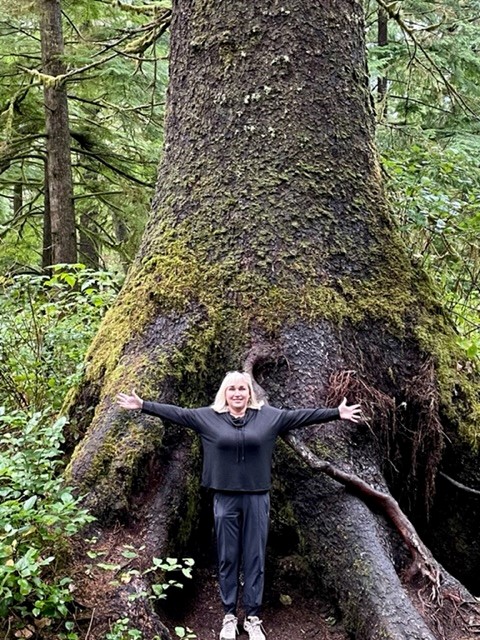
Attorney Hope Hicks, in Oregon in this picture, has traveled to all 50 states.
“I got to sit in the courtroom and watch lawyers and see how they do things and how lawyers were prepared and some lawyers were ill prepared,” says Hicks. “I wanted to be the lawyer that was prepared every time I walked into the courtroom. I wanted to be the lawyer that was on time. I wanted to be the lawyer that was professional to the opposing attorneys. I watched good lawyers and they all had those characteristics.”
She watched lawyers come into the courtroom ill- prepared who would do their very best to be effective, but she would walk back into chambers with the judge and Greenhaw would say, “You know he just barely read that file before he got here.”
“I saw the impression it made on the court,” says Hicks, “I saw the impression it made on opposing counsel. I saw the impression it made on the other attorneys sitting in the courtroom waiting for their turn. I wanted to be somebody, whether you liked what I said or disagreed with my position, you always knew I was prepared when I got there and I was going to be professional.”
When Hicks graduated from law school, she received a call to interview for a clerk position with Judge Greenhaw. The young attorney jumped at the opportunity.
“She was a wonderful judge and a wonderful mentor,” says Hicks of Greenhaw. “She was always prepared. She understood the value of a lawyer’s time. She understood the case was important to the client, no matter which side they were on. Decisions were being made and people’s lives were being affected. She wanted to be on top of things.”
Another valuable characteristic that Hicks found in the judge was that she was an excellent listener and was willing to reconsider earlier positions. Hicks has strived to emulate that ability, saying “It’s important not to get so set in what you’re doing that you can’t stop, take a step back, try to rethink your position and take the problem on from a stronger position than you originally planned.”
After only seven months as a law clerk, Hicks got another call – this time to interview for a position with a law firm that specialized in defending worker’s compensation and general liability cases for counties across Alabama. She took to the work immediately and would stay with the firm for 20 years, eventually becoming managing partner. Her practice developed beyond worker’s compensation and into broader areas of employment law and, over time, Hicks’ relationship with her clients became increasingly advisory, concentrating more on helping her clients make smart decisions early in order to avoid lawsuits later.
“I enjoyed my clients and the people I worked with and for,” says Hicks. “A good part of my practice began developing into advising employers to try to stop lawsuits from happening.”
In 2019, as a result of her broadening practice and the adjusted focus of her clients’ expectations, Hicks joined Ball, Ball, Matthews & Novak, P.A. Established in the 1890s, Ball Ball is one of the oldest law firms in Alabama. The firm, with offices in Montgomery and Mobile, handles cases involving products liability, medical malpractice and professional liability claims, industrial accidents, creditors’ rights and bankruptcy, construction matters, automobile and personal injury, governmental entity defense, aviation litigation, trucking defense and real estate.
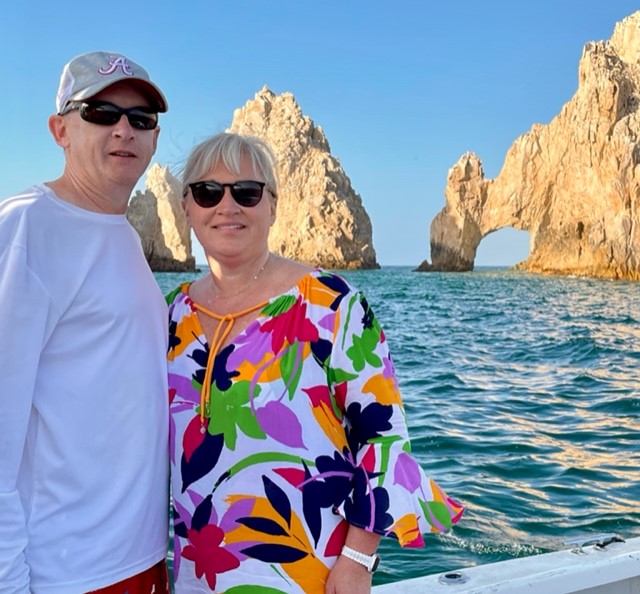
Attorney Hope Hicks and her husband, Bill, enjoy the weather in Cabo San Lucas in Mexico.
“It’s a firm that’s dedicated to delivering service to our clients and also provides a work environment for lawyers and staff where everyone can be productive and feel like you’re supported,” says Hicks. “It’s nice to be able to walk down the hall and bounce ideas off people and always be told they have time help you.”
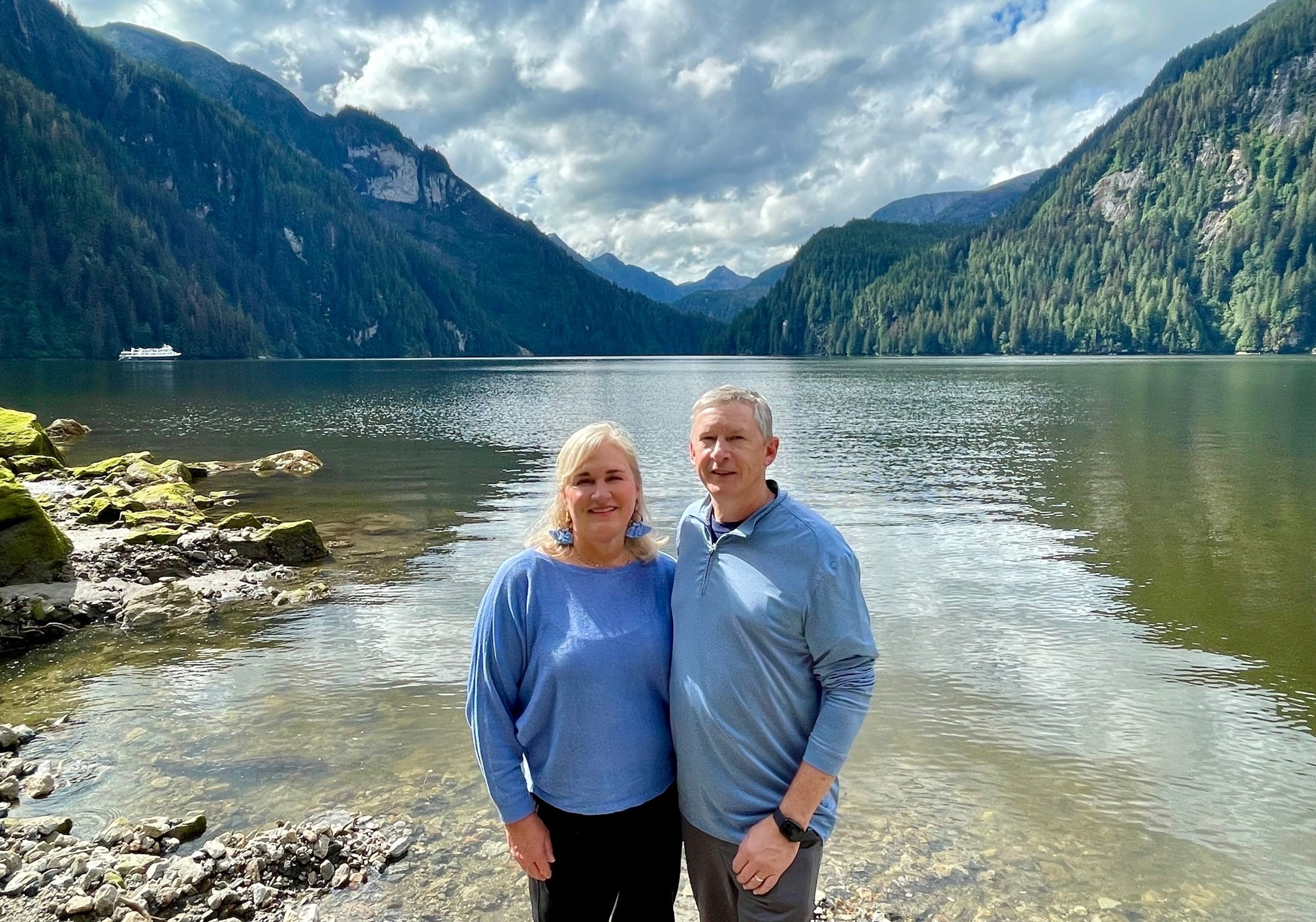
Hope Hicks and her husband, Bill, traveled to Alaska this summer, visiting the spectacular Misty Fjords National Monument, which is in the Tongass National Forest.
Hicks had just enough time to acclimate to her new firm and learn where the office supplies were kept, when the world of employment law was upended by the emergence of COVID-19.
“For an employment lawyer, there’s never been anything like COVID,” says Hicks. “It was the busiest time in my practice, without any doubt.”
Suddenly, her clients were scrambling to confront unprecedented dilemmas and confusing circumstances. Questions arose concerning the Family Medical Leave Act, the Americans with Disabilities Act, unemployment benefits, work-from-home policies, termination procedures, and more. Guidelines from the CDC were changing daily.
“I had never said ‘I don’t know,’ as much in my practice as I did through the spring, summer and fall of 2020,” says Hicks. “You had to figure it out. There was no case law, no guidance except to follow your best instinct and intuition to advise your clients.”
She opened 400 COVID cases in the summer of 2020. Though only a few made it to court, each claim still had to be investigated and statements had to be collected from employees and employers.
“It was six and seven days a week, trying to stay on top of this,” recalls Hicks.
Even now, three years later, a week rarely that goes by that Hicks does not field a question from a client related to COVID. She says the pandemic has had a lasting effect on employment law in general as companies, organizations and municipalities deal with remote work policies and ADA accommodations
One of the many resources Hicks appreciates at Ball Ball is its membership in Primerus. She had been at the firm only a short time when she learned firsthand the reach of the organization. An attorney in Paris with a client that was opening a manufacturing facility in Alabama hired her to provide training on American and Alabama employment law to its management.
“It was a such a great opportunity to get to talk with those people. That would never have happened without Primerus,” says Hicks. “Primerus absolutely opened the door.”
Though Hicks believes “…being an attorney is hard work and…you have to be willing to do the hard work to be successful for your clients,” she tries to find time to enjoy some activities outside of the office as well.
Hicks and her husband Bill are avid University of Alabama sports fans. The couple have season tickets to football, basketball and gymnastics. They also attend softball, baseball and women’s basketball games when they have a chance. In addition, she is a past president and current board member of the Montgomery Red Elephant Club, which organizes events to support the Alabama football program.
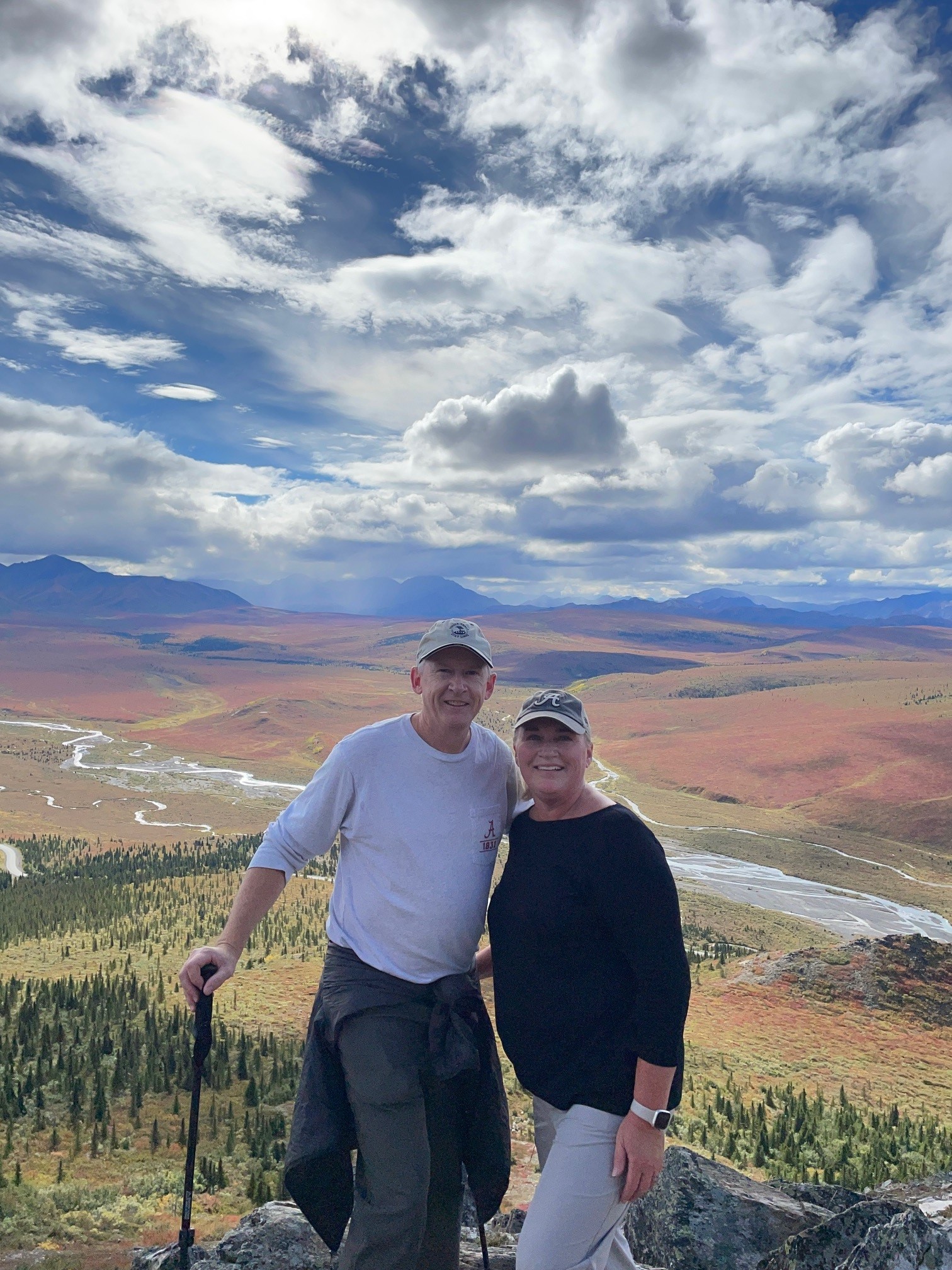
On their most recent travels, Hope Hicks and her husband, Bill, explored Alaska, including hiking Denali, the highest mountain peak in North America.
“Alabama sports take a lot of my time,” she says with a smile.

Hope Hicks’ travels abroad include a trip to Peru. She next plans to visit the Holy Land.
The couple, who has been married 13 years, also enjoys traveling. This summer, they journeyed to Alaska, which was a milestone for Hicks, who now has traveled in all 50 states. She also has a goal of visiting all 30 Major League Baseball stadiums (she’s currently sitting at 22). She hopes to travel to Israel in 2023.
“I’m not a happy person in this world unless I have a trip planned,” says Hicks, whose first present to her husband was a set of luggage. “You’re going to need this,” she told him.
“I like to go and see how people live differently and how they live the same,” says Hicks. “It’s amazing how small the world really is.”
Hicks also finds time to serve on the board of Medical Outreach Ministries, a Montgomery-based nonprofit that provides healthcare to uninsured residents in the surrounding counties. The clinic is made up of medical volunteers including doctors, nurses, pharmacists, mental health counselors and a diabetes self-management educator.
In her continuing effort to help her clients make smart decisions that keep them out of legal difficulty, Hicks speaks a lot at conferences and training sessions with human resources professionals around the state, trade groups and associations and at Auburn’s Center for Government Education.
Her message is simple and direct.
“Let me teach you and train you before you get into trouble,” she tells them. “Let me help you figure out how to do this the right way before you do something the wrong way.”


